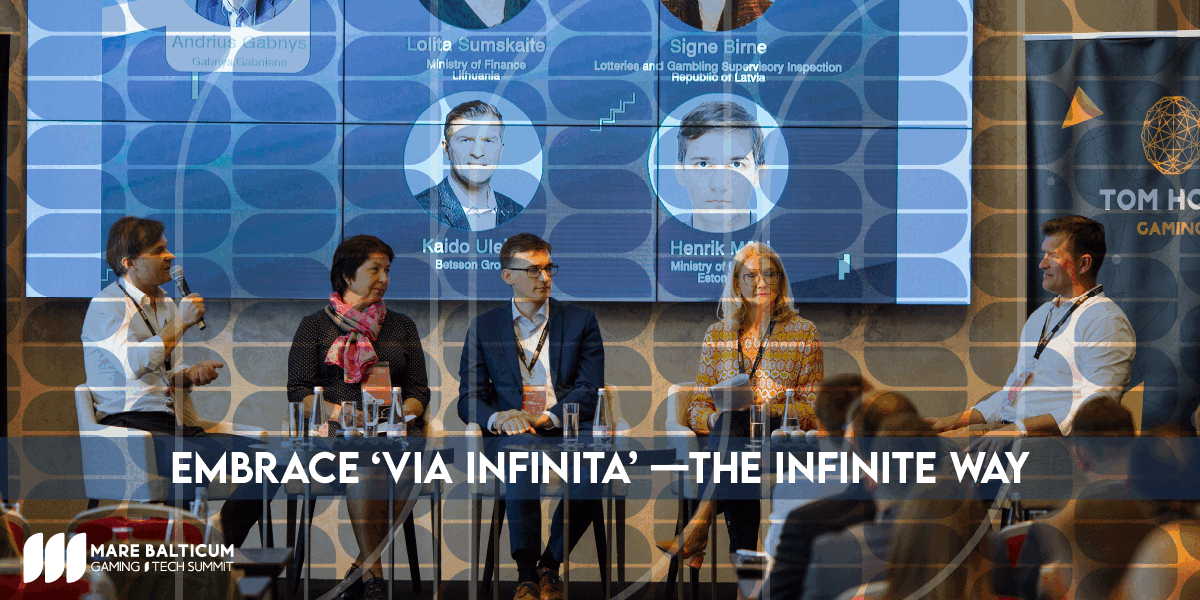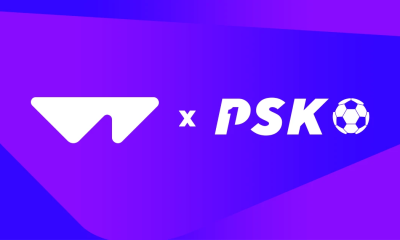Interviews
Roundtable: Keeping games studios competitive
In this panel discussion, we ask four of the leading games studios what direction games studios are heading in and the trends they are keeping on top of in what is a fast-developing space
Panellists:
Vigen Safaryan, CPO, Galaxsys
Danielle Calafato, CCO, Gaming Corps
Anna Vikmane, Director, BETER Live
Julian Borg-Barthet, CCO, Lady Luck Games
How has your content given you cut-through and how has it developed since you first came to market?
Galaxsys: Our content has given us cut-through by offering unique and engaging gaming experiences to our partners. From the moment we entered the market, we have continually invested in research and development to create innovative and high-quality games that appeal to a wide range of players.
Our games are designed with the latest technologies and we also leverage customer data and feedback to refine our games and ensure they meet the evolving preferences of our audience.
Since entering the market, our content has evolved to offer a wider range of games, including crash-type games, turbo games, card games, and new, cutting-edge titles.
Overall, our focus on quality, innovation, and responsible gaming has enabled us to stand out in a competitive market and gain a loyal customer base. By continually investing in our content, we remain committed to delivering exceptional gaming experiences to our players.
GC: We started out in mainstream gaming, although that was some time ago now. We applied for our MGA license in 2019, which was approved in 2020. We then started by making slot games, pivoting briefly to instant win content like Mine and Crash games, where we knew there was a gap in the market and we could be competitive while we looked to bring in more experienced people as part of our longer-term strategy. We also produced table games that allowed customisation, from skin tone options on the 3D hand animation through to customer branding.
With the success of Jet Lucky 2 and Coin Miner, we were then able to action the goal of bringing in new people and had an influx of high-calibre staff who had a wealth of gaming industry experience under the guidance of Alex Lorimer, our Chief Operating Officer. Ultimately, this brought us almost full circle and back to the development of competitive slot development, with what has so far proven to be great results.
BETER: As a new company, we have been able to build our product from the ground up and this has been a huge advantage. It has enabled us to use cutting-edge technologies and the latest code, combined with the team’s incredible knowledge and experience, to build the foundation of our portfolio with core table games such as blackjack and roulette. We have also added innovations and new product verticals such as gameshows to our roadmap. Our strong technical base gives us the platform to do this while ensuring the quality of our games is second to none.
Our recently-launched Gravity Blackjack is a great example of how we have taken a classic live table game and given it the BETER twist. We placed multipliers on side bets to add more intrigue to each round. The player never knows where the desired multiplier will be and can try different combinations of bets to see what their luck will bring them.
LLG: We have always aimed to strike the balance between different while also developing games that players want to play. As a team, we are passionate and imaginative, and have always pushed the envelope when it comes to creativity and not being afraid to try something new. This approach has worked well and the feedback we have received from operators and players has been positive to a degree that we simply did not expect.
Of course, we have evolved a lot since our first game release and each title is better than the last. This is only possible because we listen to the feedback we receive from our partners and their players, and ensure it is implemented across our product roadmap. For example, this has seen us add ‘buy bonus’ options to our latest titles. But part of our job as a developer is to bring new ideas and concepts to the market that take players by surprise, so we are always trying to seek conformity while at the same time trying to break it.
To what extent has seasonal content helped improve your offering and what long-term value do these games offer?
GC: As a supplier, it is imperative we are tuned into current trends and can read into player appetites at any given time. For example, Christmas music works on games in December in countries where it is a celebrated occasion. It’s about tapping into a feeling or emotion and ensuring you have content to fit.
From a studio’s perspective, you’re always looking to serve content when the audience is most receptive; making sure the day and date a game is released is something that is considered with your audience in mind. There are multiple games on offer for special occasions, but fewer than there are general releases, so your competition is arguably lessened. If your content is good, the chances are by having seasonal content, you and your customer can see better rewards over these periods.
BETER: Seasonal content is important and always generates great results – both in terms of acquisition and retention – for operators. For BETER Live, we spent year one of operations being focused on putting the technical foundations in place and producing our portfolio of core live titles. Now we have moved into year two, seasonal content is very much included in our product roadmap. We have worked with a couple of operator partners already to customise tables around certain events. This includes a collaboration with our partners for the World Cup, where we changed the UI on our Top Card title to be all things football fever, with the dealer also encouraged to chat to players about the tournament. It was a huge success for both our partner and BETER LIVE.
It was actually a straightforward project for us to launch. Our cutting-edge platform and tech stack allows us to offer a personalised UI to all operators – even on our network tables – so it was a case of deploying this with Parimatch as well as making a few changes to the studio and of course briefing the dealer. It is certainly something we are now looking to do with more operators, as well as launching seasonal tables and games over the coming months.
Where do you think casino games/live casino can improve and what kind of innovations do you think we will see in this space in the coming years?
Galaxsys: First, I think by incorporating more gamification elements into casino games and live casino, we can increase engagement and loyalty.
Second, VR and AR technologies offer a highly-immersive gaming experience. We expect to see more VR and AR-powered casino games and live casino features.
Then there is social gaming, which is becoming increasingly popular. We are likely to see more social gaming features incorporated into casino games and live casinos.
Finally, responsible gaming is becoming more important, and we anticipate more features and tools introduced to help players manage their gaming habits and promote responsible gaming.
GC: I believe there is finally a consensus from providers and operators that there is real value in offering alternative types of product. When you look at the slots space and put the most innovative product of today next to a game from 15 years ago, how much has truly changed beyond the game aesthetically looking a lot more modern and polished?
If we look at mobile gaming, we can see a big trend over the last five years where social elements are becoming increasingly popular; things like sharing your wins or communicating in a live channel. Live casino has begun to take shape recently to include this, but casino games are only just moving in that direction.
BETER: When it comes to live content, the sky really is not the limit and I think we will see great strides taken with the gameshow format. Of course, such is the scope of what can be done with live content, I think we could ultimately see new formats land in operator lobbies, including live crash games.
LL: The problem with innovation is it always leaves a portion of the market behind. Just because I can afford to play and want to play does not mean I can access a live dealer studio on the go; even in the UK, mobile infrastructure is limited and not consistent. Socially, I want to play on my own terms and that is fast and discreetly on my phone.
Also, disabilities are wide-ranging, and sight impairment is something we need to be aware of, so this means everything should be crystal clear, easy to find, and highly entertaining. This might not be the sort of innovation we often talk about, but for me, it’s just as important as new pay ways, crazy mechanics and big bonuses.
Powered by WPeMatico
Holly Fairweather Head of Account Management at House of Brands provider White Hat Studios
Women in iGaming Interview: White Hat Studios’ Holly Fairweather
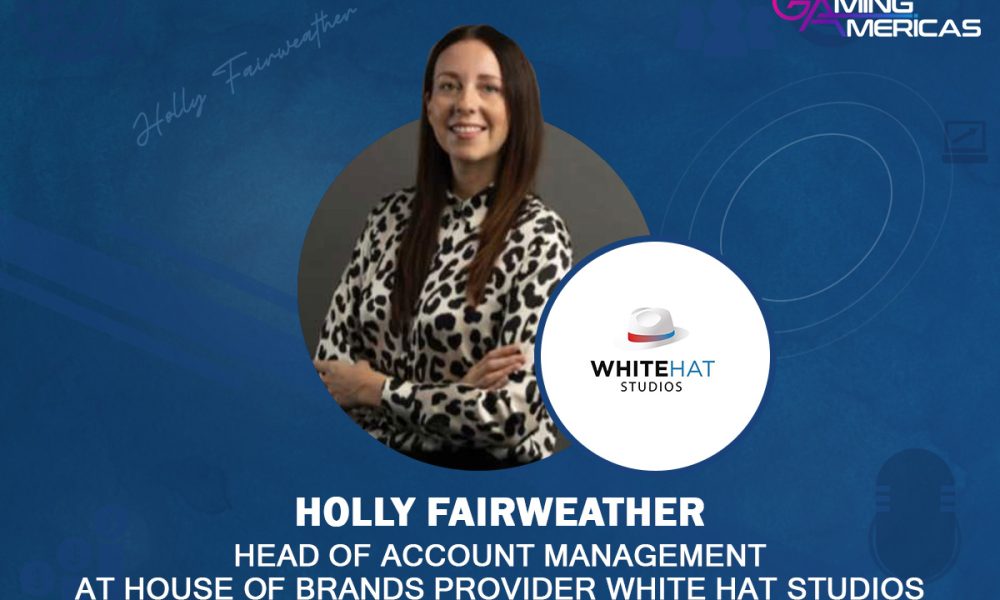
Holly Fairweather, Head of Account Management at House of Brands provider White Hat Studios, sits down with Gaming Americas to discuss the growing influence of women in the iGaming industry, and highlights how more can be done to improve the overall gender imbalance
Gaming Americas: Since joining the industry in 2018, have you noticed a change in how women are represented within iGaming companies, as well as general attitudes?
Holly Fairweather (HF): When I reflect on the past six years, it feels great to say I have seen a lot of positive changes in our industry and more importantly, an ever-increasing drive to address gender diversity. There is still work to do, and I am reminded of this attending our industry events, where it’s very evident we still lack female presence in C-level roles and on expert panels. It’s also not hard to see walking around conferences the overall gender imbalance that exists. With that being said, I do feel it’s moving in the right direction and I am regularly inspired by women around me being promoted to senior management roles, providing great mentors and role models. Awareness of gender diversity and celebrating success is continually being pushed via various channels, and for me plays a big part in why we are seeing more women have the confidence to progress in their careers and more women enter the industry. It’s also important to say, and why I think change is happening more, that the want of women to succeed and to increase female presence in our industry, is indeed backed by a strong support network of women supporting women, but also of the men in our industry.
Gaming Americas: How important are groups like Global Gaming Women? What kind of initiatives have they offered to help your own career development?
HF: I’ll be honest, I’m still learning about all that Global Gaming Women offers. Working in the US market I see GGW as a substantial network which offers reams of support from training courses, lean in circles and mentorship and networking events just to name a few. I have taken part in a few of the industry wide networking events, and really enjoyed them, connecting with some amazing people, learning more about the industry. One of my objectives this year is to participate in more events, adding value where I can whether that’s within the GGW network or through other avenues.
Gaming Americas: What more can the industry do to make it more appealing to women and ensure they are better represented within organizations?
HF: It’s got to start within each individual company taking responsibility for equal representation. This is not a tick box exercise to achieve a target on a gender split % by x date but must be about promotions and roles being rewarded to the best candidate for the role, regardless of gender, ethnic background, or sexual orientation. We need to shout about the success stories of DEI within the industry, creating an inclusive work environment will attract not just more women but more candidates overall, increasing the talent pool.
There is also a piece around exposure and shining the light on the fantastic women we have leading the way. Sharing their career paths, the good, and the challenges, to provide relatable examples of success. To make women in gaming not about the stats or portray the headline as a negative but more around showcasing the women that are successful and why, helping more women relate and pursue a similar path if this is what they wish to do.
Gaming Americas: What advice would you give to the next generation of women that are looking to make a breakthrough in the industry?
HF: This is a good one! First and foremost, you lead your own progression. Be proactive in building your network, push yourself out of your comfort zone to attend networking events. Reach out to other women in the industry for support and mentorship. That is on you to drive.
Immerse yourself in a team with values that align with yours, a team that welcomes and promotes diversity of all types and supports and rewards on merit are key.
Build your knowledge, for me knowledge is confidence. Quickly realise it is ok not to know everything, ask the questions and find out. Be solution-oriented, supporting your superiors will get you noticed for going over and above and adding value to your team and company.
I was told ‘people do business with people,’ which I stand by and could not be truer in the igaming industry. Always treat everyone with respect, be kind, be yourself, but don’t forget to back yourself! Relationship building is so key in this industry and has helped me progress to where I am today.
Lastly, take risks. And by this, I mean sometimes you must step out your comfort zone and push yourself to try something different to progress to the next stage. So far, the most pivotable moment in my career and biggest risk I have taken, and I’m sure Andy Whitworth (CEO) and the White Hat Studios (WHS) team won’t mind me saying, was accepting the job at WHS. A brand-new supplier to the US, no content live alongside the fact I had never worked in the US market, so of course there was an element of risk. It was, however, a calculated risk as I was joining a team of experts, senior level management I had worked for previously, in an ever-growing US market. A no brainer now when I look back.
Gaming Americas: From a White Hat Studios perspective, what DEI initiatives does the company put in place?
HF: DEI of all types is something I believe increases the performance of a team, and is something we are extremely passionate about at WHS. As we grow and expand, maintaining a strong culture has never been more important. We recently held a WHS workshop in Prague, with one section of our day spent holistically agreeing and locking down our values as a team, ‘Who we are, what we stand for ‘and ‘treating everyone equally’ is now embedded in our company culture as one of our five core values.
I have been lucky in the fact I have never felt that my gender has held me back in my current role and previous igaming companies. Although I understand this has not been everyone’s experience, I truly believe the more we celebrate success, drive awareness, embed inclusion within our companies, and work together across DEI as a whole, we will continue to see women progress and take on careers in igaming.
Compliable
Reputation matters – the importance of supplier licensing
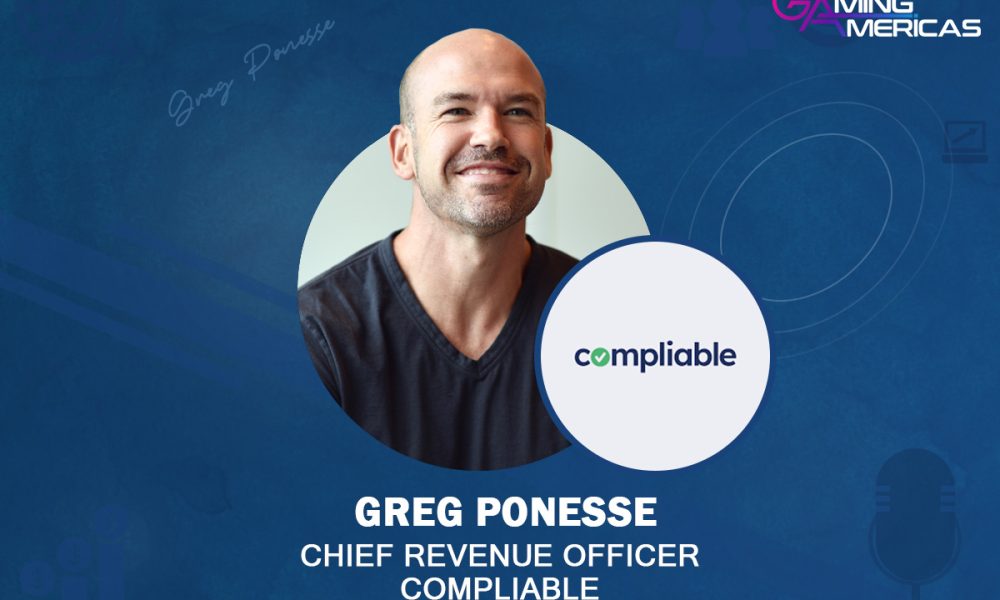
More and more jurisdictions are introducing licensing for B2B providers in an attempt to boost regulatory oversight and restrict black market activity with Sweden and Denmark recent examples. In this piece, we talk to Greg Ponesse, Chief Revenue Officer at Compliable, about how the increased compliance burden can favour suppliers’ standing in the iGaming ecosystem.
Have you seen a shift in attitudes from suppliers to only provide products in regulated markets?
We have seen that suppliers that have traditionally taken a .com approach are starting to move towards being licensed to secure additional revenue and more customers but also to improve their overall reputation and standing. The perception of brand integrity plays a big part of the decision-making process because some operator partners might be reluctant to work with suppliers if they have a mainly grey-market approach.
In the US, supplier licensing has always been the norm, so where we are seeing attitudes changing is primarily with European suppliers. Although most suppliers might have a few licenses that they need to manage in key markets, they are now better understanding the importance of being seen as fully compliant across the board as regulation changes and operators are looking for trusted partners.
Some of these brands are massive enterprises who are now trying to get a handle on how to manage all their licenses across multiple regions, and we have seen an increased interest in our software to support that.
What has been the driving force for this – regulator pressure or business strategy?
It’s a little bit of both. Regulator pressure is definitely a big one as gambling becomes more ubiquitous and mainstream. It’s the responsibility of the government to provide structure and regulation to ensure safety for consumers and many are starting to realize that suppliers play an equally important role in that as operators. We have recently seen examples of locally licensed suppliers being fined by regulators for offering their products to unlicensed operators, so providers need to be on the ball to ensure their reputation stays intact.
That said, the grey market suppliers up to this point have stayed in grey markets because that’s what was available to them. Now you’re seeing new markets opening up like North America, which has been huge, where all states require suppliers to be licensed. These grey market players that have previously focused on Europe now see that there’s revenue over there to be gained, so they need to pull up their socks and play the game.
As a business strategy, suppliers can only remain in black markets for so long, avoiding paying taxes and declaring revenue. In a competitive marketplace, suppliers can definitely benefit from being more established and having numerous licenses. Operators might be wary to work with companies that don’t take compliance seriously so being able to show that you have X number of licenses and that you have infrastructure in place shows that you’re serious, and that you know what you’re doing. It kind of sets the table for you to have a soft landing and to be able to begin those discussions with potential partners.
A sole focus on regulated markets would suggest a negative impact on profits so what benefits do suppliers see from being licensed?
If the train is only going in one direction, you eventually have to hop on it. Moving away from grey markets will inevitably have a negative impact on profits but you then have to look at where you can find additional revenue. If you are a licensed supplier, it does allow you to work with the big local operators. You have to decide on whether you can make more money as a grey-market supplier or by going into markets being licensed and making the most of what that offers.
Do you expect more jurisdictions will introduce B2B licensing going forward?
Yes, for sure. Gambling is ubiquitous now and governments recognise that it’s a great revenue generator for them and it also helps with ensuring responsible gambling. With licensing, you provide a framework, infrastructure, and environment that is safe, and it ensures that everyone is on a level playing field. That needs to include all different sides of the industry such as operators, suppliers, affiliates etc. If everyone in the ecosystem follows the rules, it will be a better place for all.
What are the big challenges that suppliers face when it comes to licensing in 2024 and beyond?
Your licensing strategy, so basically, where you are going to go get licensed. This process takes time and resources, and you want to make sure you are prepared before you start talking with operators. They will want to know, just like as with any other vendor, if you are licensed as a supplier.
If we use the US as an example, there is no shortage of suppliers that want to partner with the available operators, so you need to know who you want to work with and where, and then you have to make sure you sort those applications properly. That is all about getting the right advice or using software because if you fail the process, you will end up at the back of the queue and your go-to market strategy will be delayed.
What, if any, are the key differences between licensing in the US and regulated markets in Europe and other regions around the world?
For starters, every state in the US acts as if it is its own country and the licensing process is very complex and rigorous. In Europe, it was initially somewhat more relaxed. You got your Malta licence, and that was then good for all countries in Europe. We’re now seeing a bit of backtracking, with more and more countries getting tougher on rules and regulation.
Increased supervision, with regulators having more oversight, means there is no hiding and I think that is what we’re moving towards on a global scale.
I do believe that most suppliers and operators prefer a regulated market because it separates proper companies from the bad ones. If I was a large operator or supplier that invested time and money into licensing and establishing a compliance team, I would feel good about that because there are so many companies that can’t do it. There’s this element of pay to play, so to speak, in order to really maximize your profits in a region.
Interviews
Changing the game for content aggregation
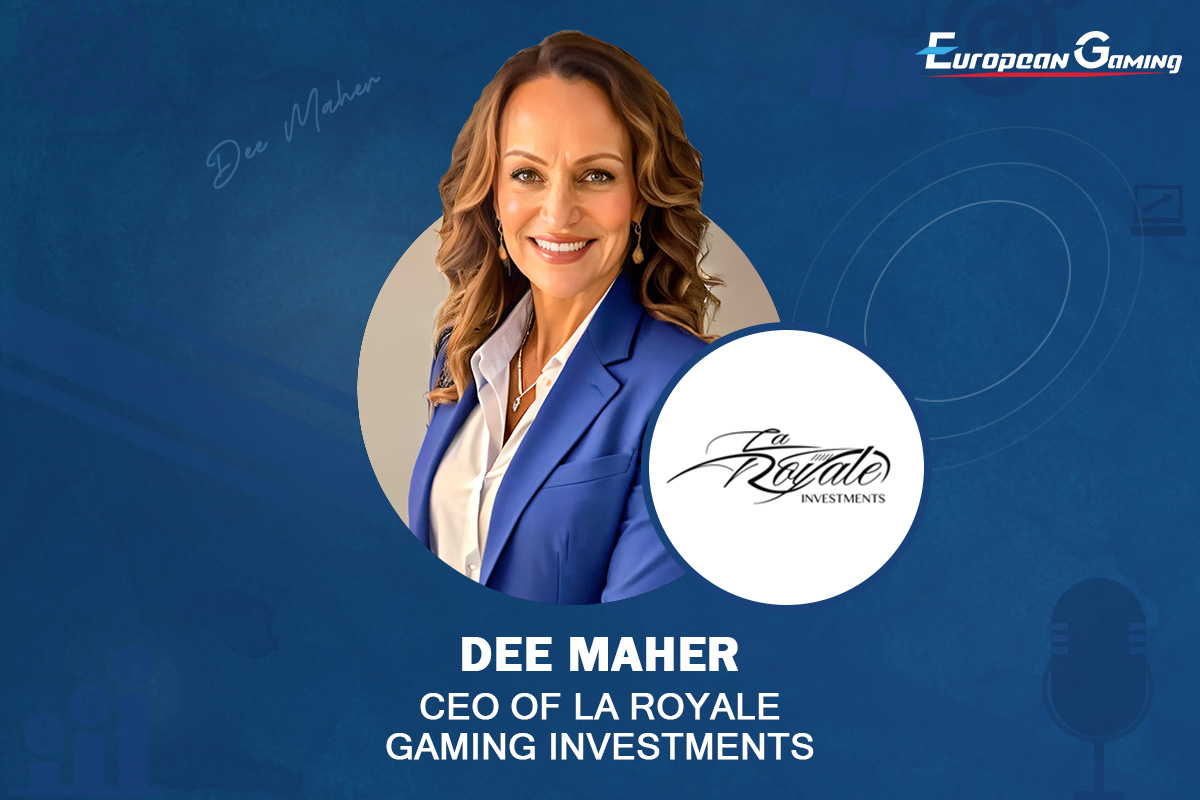
We sit down with Dee Maher, CEO of La Royale Gaming Investments, to learn more about her recent appointment as CEO and how the company is set to challenge the gaming industry’s conventions.
La Royale Gaming Investments has bold plans to become a true power player and redefine industry standards. Through acquisitions and mergers, it intends to build an “ecosystem” of online and offline companies, covering both B2B and B2C. Its first play is Quanta, a unique content aggregation platform designed to leverage a high volume with a focus on delivering unparalleled value at a fair price, aiming to introduce innovative solutions for both operators and suppliers. To learn more about La Royale and its goals for the coming 12 months, we spoke with recently appointed CEO, Dee Maher.
Tell us more about your journey to being appointed as CEO of La Royale Gaming Investments.
I’ve been working in the global online gambling industry for many years now in roles covering legal and compliance leadership. Over the past 15 years, I have had the privilege to work for some of the biggest organisations in the business including the likes of Genesis Global, Betclic, Vera&John and Evolution Gaming. When I was approached about joining La Royale Gaming Investments as CEO, it was an offer that I couldn’t turn down. Recognising the company’s ambition to forge a transformative path in the gaming sector, I was compelled by the vision to lead change and drive innovation. My decision to accept was driven by a profound commitment to spearhead our mission, leveraging the remarkable talents of our team to redefine industry standards and make a lasting impact.
What are your main responsibilities and where are you looking to progress most?
I have been tasked with supervising the expansion of our investment portfolio by recognising opportunities that are aligned with our online and offline strategies. I am also overseeing the day-to-day running of Quanta, our inaugural venture, which stands out in the crowded marketplace as a game aggregation platform like no other. In terms of where we are looking to make the most progress, we plan to curate a unique ecosystem of innovative offline and online gaming companies through strategic mergers and acquisitions which combined will make La Royale Gaming Investments a real tour-de-force in the sector and one of the top tier companies with interests across both B2B and B2C.
How is La Royale Gaming Investments going to disrupt the industry? Is it taking a different approach?
La Royale Gaming Investments is poised to redefine the gaming industry with a strategy rooted in bold vision and innovation. We have built out the best team to deploy these ambitious plans and achieve our strategic goals. We are well-capitalised and have lined up our first run of acquisitions, starting with Quanta. Our approach focuses on identifying USPs within each business we engage, introducing ground-breaking offerings to the market. With Quanta, that is being the first mass-market game aggregation platform, creating value for both operators and suppliers. This is an industry where many follow the same blueprint, but we know that to pull distance from our competitors, we need to do things a little differently.
I think our biggest point of difference is that we are curating an ecosystem of innovative businesses across all areas of gambling and gaming. This includes both online and offline, and both B2B and B2C. There are not many organisations in the industry that are this broad and diverse so again this is an area where we can really stand out.
You mentioned that Quanta is the first mass-market game aggregation platform. What does it offer operators and suppliers and how is it different to other solutions in the market?
Quanta has been developed so that it can handle the largest possible volume of games from a diverse array of providers and seamlessly integrate with a vast network of operators. Due to this volume, we can offer the best commercial deals to both parties. Our scale, in collaboration with leading studios and casinos, positions us as a frontrunner in content distribution. Furthermore, we are committed to achieving certifications across all significant regulated markets. For operators, this means they can quickly and easily add games to their lobbies and for studios, it means access to the widest distribution network and thanks to our minimum reseller fee structure, we make this access available to all providers from the established titans to the rising stars.
But just to be clear, Quanta transcends the ordinary, offering not just a cost-effective solution but a sophisticated high-performance platform. The platform is state of the art, allowing for seamless integrations for both operators and suppliers while ensuring the highest standards of resilience and performance. The concept is simple – high volume, low cost – but the advanced technology and strategic foresight required to realise this vision set us apart from conventional solutions in the market.
Content provision is highly competitive so what makes you confident that Quanta will be heard above the noise being made by other providers and aggregators?
Our mass market approach is unique and is already helping us to stand out and generate significant interest from both studios and operators. In the current challenging economic landscape, efficiency and cost-effectiveness are paramount for all stakeholders. But our advantageous commission structure is not the only way we are helping here. At present, operators often have many integrations with various aggregators and directly with game providers. This is inefficient and expensive. With Quanta, operators can plug into a single platform and access all the content they need for each market they target allowing them to save significant resources or to deploy these resources elsewhere.
On the subject of the current economic climate. Is now a good time to be building a business based around M&A?
That depends on how you are approaching your M&A activity and whether an organisation is taking on debt. Timing can be crucial here – you just have to look at the likes of 888 to see how a change in the direction of the wind can have a brutal impact on the wider organisation. That said, there are always plenty of opportunities to acquire great businesses, technologies, solutions and so on, and part of my remit as CEO is to spot these and if they align with our wider approach, make a move. I think the 12 months ahead will be incredibly exciting when it comes to M&A, with some truly transformational deals taking place – something that La Royale Gaming Investments intends to be a part of.
The post Changing the game for content aggregation appeared first on European Gaming Industry News.
-

 Balkans7 days ago
Balkans7 days agoWazdan marks Croatian market entry with PSK partnership
-

 Africa7 days ago
Africa7 days agoHub88 partners with LiveGames to enhance content offering
-

 Bryan deLugo7 days ago
Bryan deLugo7 days agoSacramento Kings and Red Hawk Resort + Casino to Unveil Themed $1 Slots
-

 Latest News7 days ago
Latest News7 days agoF1 Star Joins SOFTSWISS as LatAm Non-Executive Director: Key Highlights
-

 Alex Lieblong7 days ago
Alex Lieblong7 days agoArkansas Casino Seeks iGaming Approval
-

 Australia6 days ago
Australia6 days agoCrown Reinstated at Sydney Casino
-

 Compliance Updates6 days ago
Compliance Updates6 days agoBrazil’s Ministry of Finance Appoints Régis Dudena as Secretary of Prizes and Betting
-

 Latest News6 days ago
Latest News6 days agoContinent 8 Technologies set to debut in Brazil: Latin America’s next iGaming frontier

